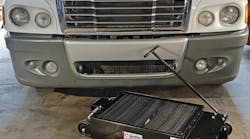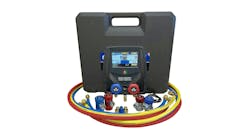Tanks and pumps rightfully deserve considerable attention when configuring a fleet's lubrication system. But when it comes to the dispensing and disposing of lubricants, there are other tools and shop equipment that can also help improve productivity.
Hose reels are a necessity that helps to improve both efficiency and safety. Durability is a key consideration. Reelcraft reels, for example, are made of stamped steel components designed for the rigors expected in a work truck application.
"FEA (finite element analysis) is used to identify all areas where extra strength is required via analysis under various loading conditions," says Ed Walter, director of engineering at Reelcraft Industries, a manufacturer of hose reels, cord reels and cable reels for industrial, commercial and professional applications. "Our reels must then pass cycle testing for drive springs, swivel assemblies, hubs, bearings and roller assemblies. Additionally, retraction testing is performed from various heights, mounting positions and working pressures to qualify spring designs."
Used oil removal is another necessity. JohnDow Industries offers two low-profile drains designed to slide underneath heavy duty vehicles. Brian Morgan, JohnDow national sales manager, says the 25-gal-capacity model is popular due to its extra capacity. However, the 17-gal model is also quite popular with fleets because it can accommodate a self-evacuation kit.
"You can hook up to the shop air to blow the waste oil into a drum or tank," Morgan says. "It's hard to get to the electrical outlets in some shops, which you need in order to power our 25-gal model that uses an electric pump to suck the fluid out of the drain. Plus, if the oil is a bit older and sludgier, it's much easier to evacuate it with forced air." JohnDow is a manufacturer of oil and fluid-handling equipment, DEF service equipment, interior protection products and exhaust extraction systems.
JohnDow also offers upright oil drains as well as fluid evacuators. A product that's gaining in popularity is its oil filter crusher.
"This is really coming into play in California where they are more aggressively enforcing regulations surrounding used oil filter disposal," Morgan says. "Our crusher removes 95 percent of the residual oil. Another factor is that some disposal companies are charging by the barrel. You'll get considerably more filters in a barrel if you crush them, which results in fewer calls to the disposal company and lower costs for the fleet."




